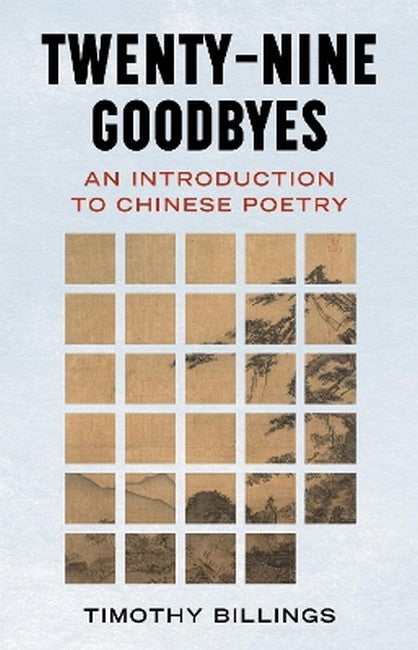Timothy Billings is Professor of English and Comparative Literature at Middlebury College, where his expertise spans classical Chinese literature and Shakespeare. Billings has edited and translated three award-winning bilingual critical editions that draw upon Chinese sources: Victor Segalen's Steles / ???? (with Christopher Bush), Matteo Ricci's Essay on Friendship / ???: One Hundred Maxims for a Chinese Prince, and Ezra Pound's Cathay / ?. His work bridges the gap between Eastern and Western literary traditions and enriches the study and appreciation of classical Chinese poetry and its influence on global literature.
Request Academic Copy
Please copy the ISBN for submitting review copy form
Description
Introduction 1 1 "Taking Leave of a Friend," Ezra Pound 4 2 "A Farewell," Herbert Giles 8 3 ??? (Seeing Off a Friend) 12 4 Categorical Comparatives, with Wang Li 16 5 "Sending Off (a) Friend(s)" 20 6 "Le depart d'un ami," Judith Gautier 24 7 "Saying Good-Bye to a Friend," Amy Lowell and Florence Ayscough 28 8 "Adieu," W. J. B. Fletcher 32 9 "Valedicit amico," Angelo Zottoli 36 10 "Geleit," Alfred Forke 40 11 "Taking Leave of a Friend," Obata Shigeyoshi 44 12 "Je reconduis un ami," Bruno Belpaire 48 13 "Le chanson d'adieu," Jean-Marie Guislain 52 14 "Farewell to a Friend," Henry Hart 56 15 "A Farewell to a Friend," Witter Bynner and Kiang Kang-hu 62 16 "J'ai reconduit mon ami . . . ," Tchou Kia Kien and Armand Gandon 66 17 "Saying Farewell to a Friend," Robert Payne 72 18 ?? (Paraphrase), Xu Zhengzhong 76 Digression: Peng ? vs. Peng ? 82 19 "Farewell to a Friend," Adet Lin 86 20 "Taking Leave of a Friend," Innes Herdan 90 21 "Farewell to a Friend," Xu Yuanchong 94 22 "taking leaves (1)," "parting friend," Harry Gilonis 98 23 Tonal Balance: Ping ? and Ze ? 102 24 "Seeing Off a Friend," Jonathan Stalling 106 25 "Seeing Off a Friend," Gregory Whincup 110 26 "Seeing Off a Friend," Edward Chang 114 27 "Seeing Off a Friend," Red Pine / Bill Porter 118 28 Yinsong: In Song 122 29 "Seeing Off a Friend," Timothy Billings 130 Epilogue: What's in a Name? The Sonnet 152 Acknowledgments 163 Notes 165 Credits 177 References 179
This little book is excellent both as a model of close reading and a celebration of the qualities of classical Chinese literature. Highly recommended.-- "Choice Reviews" A fascinating initiation to the delights of Chinese verse.---Publishers Weekly A great and important and very much needed book---Eric Hayot, author of Humanist Reason: A History. An Argument. A Plan Critically acute and compulsively readable, Twenty-Nine Goodbyes offers an illuminating introduction to Chinese poetry and poetics through the shifting lens of translation. Billings's 'cubist collage' of renderings of a famous parting poem by Li Bai is equally a meditation on the challenges--and the pleasures--of translating the untranslatable, all conveyed in a vibrant, colloquial teacherly voice. Readers will close this book with a sense of parting from a newly found old friend.---David Damrosch, author of Around the World in 80 Books More than just an excellent primer in classical Chinese poetry (which it is), Twenty-Nine Goodbyes shows how Chinese poetry and Anglo-American poetic traditions intertwine. Bristling with detail and poetic insight, the book shows what it means to translate between languages and traditions, and more importantly, what it means to make poetry. A gem of a book.---Ming Xie, University of Toronto Timothy Billings's introduction to Chinese poetry through twenty-nine reinventions of a single Li Bai poem is a tour de force of literary analysis, multilingual erudition, and the blended pleasures and frustrations of reading poetry in translation. This lively, accessible, and often funny introduction will enlighten newcomers and scholars alike.---Anna Shields, Princeton University

